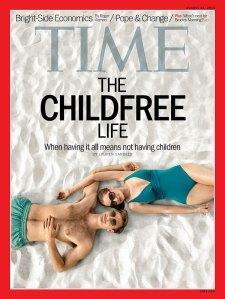
Selfish, decadent, irresponsible are just a few of the words sometimes used to describe those of us who have chosen not to have children. Oftentimes these charges are nothing more than a kneejerk reaction to an emerging lifestyle choice that is at odds with longstanding tradition. It’s common for such criticisms to be levied at people who buck convention. But that fact alone doesn’t prove the accusations untrue.
So when we saw that Time Magazine had titled this week’s cover story The Childfree Life, we hoped it might address these charges. And while the article takes a sympathetic stance regarding childless women, it ducks the central question. Are we and others like us selfish for not having children?
In order to pick up the conversation where Time leaves off we first need to agree on what it means to be selfish. Selfishness is not merely acting in one’s own interest. If that were enough, everything from brushing your teeth to going to work would qualify.
We don’t generally consider it selfish to eat a meal but we should all agree that it’s selfish to gobble up the last bits of food on a crowded life raft. Both instances involve eating, but only when we do it at the expense of others is it recognizable as a selfish act.
Who is the aggrieved party here?
With that in mind it’s fair to ask whose interests, exactly, are disadvantaged by someone’s decision to forgo children? I can think of two possible candidates.
The most obvious is the child who never gets to experience life. Clearly by not having children we’re advancing our own interests over those of our unconceived baby. But this raises a thorny philosophical issue. Do the unconceived have interests we need to consider? In some ways, yes.
It’s commonly accepted that we have an obligation to protect the interests of future generations. We have a responsibility, for example, to be good stewards of the earth. It would be selfish of us to deplete the world’s resources and leave a barren planet behind.
But the potential offspring of the childless do not factor into that equation. The world we leave behind is not theirs to inherit. It’s not just that they don’t currently exist. They’re not merely unborn. They’ll never exist. They have no interests, either now or in the future. Because it’s not possible for us to undermine interests that don’t exist, it’s not possible for us to act selfishly against them.
To demonstrate why this must be true, let’s consider what happens if we draw the opposite conclusion: that we have an obligation to give life to the currently unconceived. That obligation would not end when we have one child, or even ten. There’s always another child awaiting conception. Who are we to deny its rights?
Under this line of thinking every fertile female has a responsibility to have as many children as she is physically able to bear, regardless of age or marital status. To do otherwise would selfishly disregard the interests of all those potential people. Clearly that can’t be right because following through on this philosophy would lead to great harm on a massive scale.
No shortage of people
Even so, going childless isn’t something every couple can choose. If we really do have a responsibility to future generations (our second possible aggrieved party) part of that responsibility surely includes peopling that generation. Don’t we have an obligation to do our part?
Not necessarily.
If the world were running out of willing parents we might have a responsibility to “step up” in this regard. But that is not even remotely the case today. Over the past dozen years we’ve added a billion new people to the planet and are expected to add another billion over the next twelve. By 2050, the U.N. estimates the world population will be a third larger than it is today.
We humans may have many problems, but under-populating the world isn’t one of them. Over populating it might be.
Knowing this the baby scolds have adopted a more nuanced approach. Instead of arguing that the future of mankind depends on each of us having multiple children, they claim the future of our economy does. In a recent New York Times article titled More Babies Please, Ross Douthat puts it this way:
Today’s babies are tomorrow’s taxpayers and workers and entrepreneurs, and relatively youthful populations speed economic growth and keep spending commitments affordable.”
He goes on to argue that declining American fertility rates threaten our economic dynamism. So it might. But there is a far easier way to grow our population of taxpayers and workers than browbeating people into having more children. We can simply open our doors to the throngs of educated and ambitious foreigners who would love to immigrate here if only it were easier.
But instead of welcoming the tired, the poor, the huddled masses yearning to breathe free, we’re haggling over how high and thick a border fence we should construct. It’s the height of irony to be told we must have children to grow our population while also being told we need to limit newcomers from entering our ranks.
Don’t they know that my baby would take some other American’s job one day?
But it doesn’t have to. We’re reasonable people who are willing to prove our selflessness by promising not to flood the American labor market with our offspring. Alternatively, if the country wants more young workers we’d be willing to donate all the potential jobs that would have been occupied by all of our potential children to an equal number of qualified foreigners.
Either way, we’re delighted to do our part.

